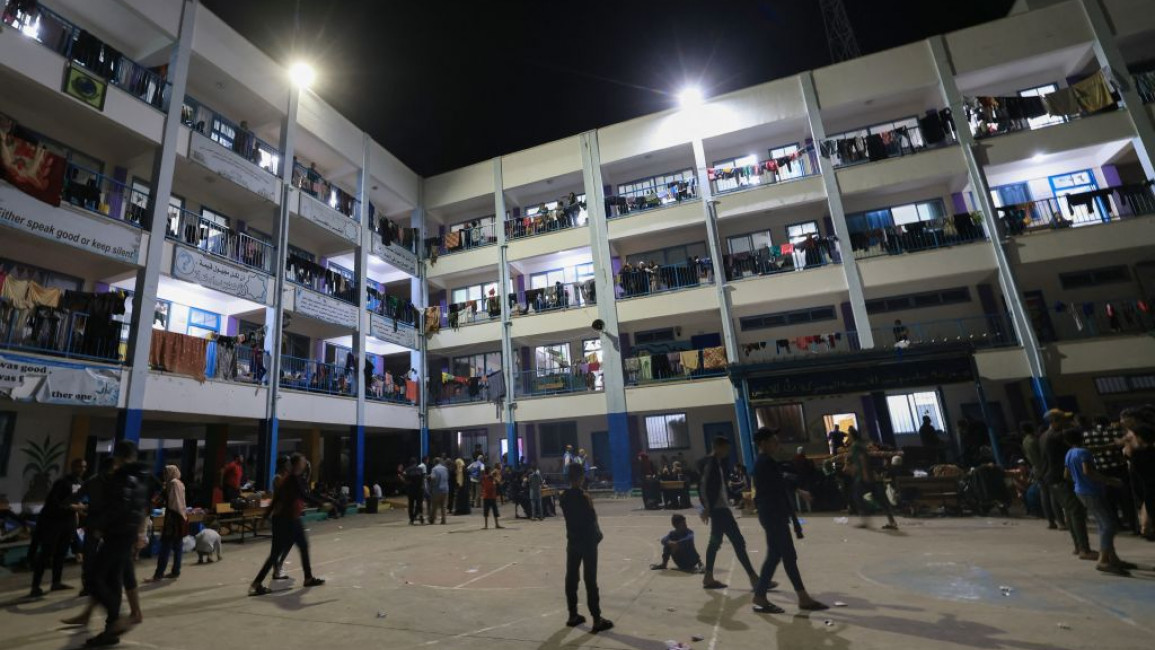Told to go to the south by Israel to be 'safe', displaced Palestinians in Gaza are bombed, hungry and scared for their lives
Displaced Palestinians are struggling to obtain water, food and security in the southern region of the Gaza Strip amid non-stop, indiscriminate Israeli bombardment for twelve days in a row.
Deir al-Balah city, located in the middle of the besieged coastal enclave, is among the most crowded areas as displaced Palestinians gathered throughout Gaza's south. Here, you can barely find space to walk or drive your car in the streets. Sadness covers everyone, and they fear what their future will hold.
This scene is punctuated with massive explosions and loud cries of the displaced as many line up long in front of bakeries and shops. Everyone immediately checks where a strike occurred, with some involuntarily rushing towards the hit site, hoping to help evacuate any survivors. Others remain where they were in the bread line, fearing that they would miss their turn and return empty-handed to their children.
"Overnight and without any warning, our lives were turned upside down. We have become homeless, not knowing what awaits us," Omer al-Naji said to The New Arab.
"Instead of heading to my job every morning, I now come to this long line and wait for long hours to get a little bread for my children, which may not be enough for one day," the 48-year-old father of six said.
For twelve days and counting, the besieged coastal enclave has been subjected to thousands of violent Israeli airstrikes, which hit thousands of residential houses and killed hundreds.
Israel claims it is only fighting Hamas, the Islamist group ruling Gaza by force, but Palestinians in the Strip assert that it is only innocent civilians paying the price of an unprecedented war between Hamas and Israel.
So far, more than 3,200 Palestinians, mainly women and children, have been killed by Israeli attacks, according to the health ministry in Gaza. More than 1.1 million people have been displaced and become homeless and defenceless without having any chance to survive the consequences of the attacks, according to UN institutions operating in Gaza.
Worsening matters further is the Israeli decision to tighten its blockade on Gaza and prevent food, water, medicine, and aid donated by Arab and Western countries from entering. The only electricity power plant has been stopped because of the running out of fuel, and the lack of electricity stops motors from pumping water to homes.
"No one can imagine our life nowadays in Gaza," al-Naji said as he wiped tears away. "We are struggling to stay alive but do not even know how to deal with such devastation."
Samah al-Masri, a Beit Hanoun-based woman in her 50s, has been displaced with her 20-member family by Israel to Deir al-Balah city, and she couldn't take any of their essential identity documents. They now shelter under a damaged trailer.
"We do not have any of the necessities of life…No bathroom, no kitchen, no water, and no electricity," she said to TNA. "We even live under the Israeli airstrikes that may kill all my family."
Mohammed Qudaih fled from his home in the eastern parts of Khan Younis with all his relatives to Rafah. But death followed them there as Israeli airstrikes struck a residential building they were staying at. More than 50 members of his family were killed.
"What was our fault to be punished like this?" Qudaih said to TNA, screaming and crying. "Everyone was turned into pieces: women, children and the elderly. How can we live again and continue our lives?"
"Israel is a criminal, and all Arab, European and Islamic countries are partners to Israel in its crimes because of their silence and complicity with this amount of feelings," he stressed.
The Commissioner-General of the United Nations Relief and Works Agency for Palestine Refugees (UNRWA), Philippe Lazzarini, warned of severe repercussions when portable water runs out on the lives of Gaza's approximately 2.3 million residents in light of the Israeli war.
"Drinking water is running out, and Gaza faces death," Lazzarini said. "Gaza usually obtains water supplies from various sources, including a pipeline from Israel, seawater desalination plants, and wells.
He explained that these supplies declined when Israel cut off water from the Gaza Strip following the Hamas movement's launch of Operation "Al-Aqsa Flood" on 7 October, parallel with the interruption of fuel and electricity that operates the water stations and the sewage network.
The World Health Organisation also warned that the lack of potable water in the Gaza Strip puts the lives of patients in hospitals and the population in general at risk.
"The Israeli occupation did not pump any litre of drinking water to any of the governorates of the Strip for the tenth day in a row, which prompted citizens to drink unsafe water, warning of a serious health crisis that threatens the lives of citizens," the Hamas-run interior ministry said.
Meanwhile, the health ministry warned that its staff may not provide medical treatments for the casualties in the upcoming days unless they receive more medical supplies.
Still, Palestinians in Gaza hope to reach a humanitarian ceasefire soon to allow them to receive humanitarian and medical aid and fuel.



![A pro-Palestinian encampment at Columbia persists, despite recent arrests. [Brooke Anderson/The New Arab]](/sites/default/files/styles/image_212x120/public/2024-04/417084c8-3251-4705-8422-058fca1d5709.jpg?h=ddb1ad0c&itok=M1RtdyYz)